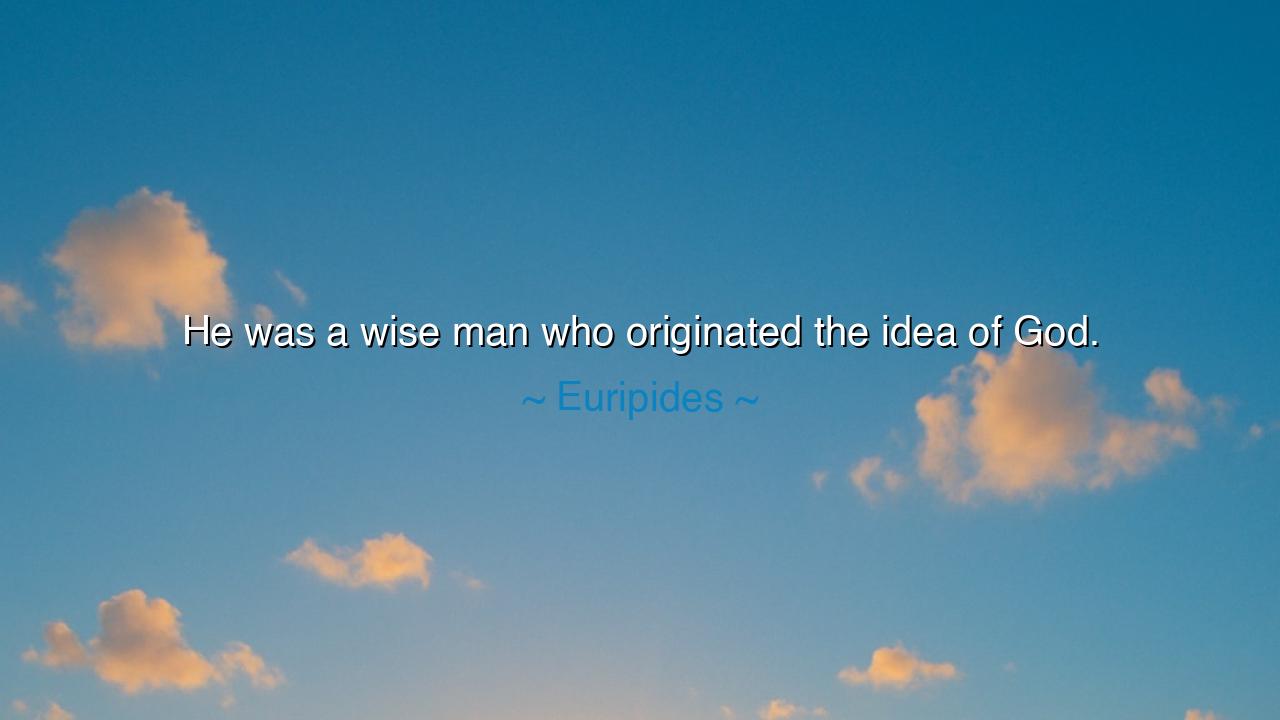
He was a wise man who originated the idea of God.






“He was a wise man who originated the idea of God.” Thus wrote Euripides, the tragic poet of ancient Greece, whose words have echoed across centuries like the sigh of a philosopher staring into eternity. In this single sentence lies both wonder and irony, both reverence and reflection. For in speaking of the man who conceived the idea of God, Euripides does not mock faith — he marvels at its mystery. He sees in it the greatest triumph of the human spirit: that in the face of the vast, unknowable cosmos, man lifted his gaze to the heavens and dared to imagine a divine order beyond himself. To give form to the infinite, to name the nameless, to perceive meaning amidst chaos — this, Euripides declares, is the mark of wisdom.
The origin of these words can be traced to the Athens of the fifth century before Christ — a world of philosophers and poets, where reason first began to wrestle with faith. Euripides lived in an age when men questioned the old gods of Olympus, their myths, and their capricious whims. Yet in his questioning, he did not reject the divine entirely; rather, he sought its essence. His thought, poised between belief and doubt, reflected a deeper truth: that even when the gods of tradition fall, the idea of God — the eternal, the moral, the transcendent — endures. The “wise man” of whom he speaks, then, is not necessarily a prophet or priest, but the first thinker who looked beyond the visible world and sensed that there must be something higher — a source of order, justice, and beauty behind the veil of existence.
From this seed, all human civilization has flowered. For the idea of God is not merely a superstition to comfort the weak; it is the cornerstone upon which law, conscience, and art have been built. When the ancient Egyptians carved their pyramids, when the Hebrews sang of the Almighty, when the Indian sages wrote their Vedas, they were all answering the same inner call — the yearning to connect the mortal with the immortal. Euripides understood that this longing was not folly but wisdom, for only those who sense something greater than themselves can rise above the darkness of self-interest and despair.
Consider the life of Socrates, who, though accused of impiety, lived as one who knew God more truly than the priests of his day. He spoke of a divine voice within, a daimonion, guiding him toward what is just and true. When condemned to die, he did not curse his fate but faced it calmly, saying that no harm could come to a good man in life or death. In his serenity, Socrates revealed the same truth Euripides hinted at — that the idea of God is not a myth of fear, but a vision of moral harmony, of divine reason woven through the fabric of being. His death became the proof that man, once awakened to the divine, can no longer be enslaved by the fear of the grave.
Euripides’ words also carry a subtle warning. For to speak of the idea of God is not to claim mastery over it. The wise man may conceive it, but the fool will corrupt it — turning the sacred into tyranny, and faith into fanaticism. Through history, kings and priests alike have misused the divine name to bind men’s minds instead of freeing their souls. Thus, even as Euripides praises the wisdom that first imagined the divine, he reminds us of the responsibility that comes with that vision. The idea of God is a torch: in the hands of the pure, it illuminates; in the hands of the wicked, it burns.
And yet, despite these failings, the idea of God remains humanity’s greatest inheritance — the compass of our conscience and the fire of our imagination. When the poet gazes at the stars, when the mother whispers a prayer for her child, when the soldier lays down his life for justice — in each of these acts, the divine idea lives. It is not bound to temples or creeds; it dwells in the nobility of the human heart that still dares to believe there is meaning beyond the dust.
So, my child, learn from Euripides’ wisdom. Do not take the idea of God lightly, nor discard it in cynicism. To believe is not to surrender reason, but to elevate it — to let your thoughts ascend from the visible to the invisible, from the transient to the eternal. Seek the divine not only in heaven, but in truth, in virtue, and in love. And when you find it, honor it — not through words alone, but through a life that reflects its light. For indeed, he was a wise man who originated the idea of God, but wiser still is the one who lives by it — humbly, reverently, and with eyes lifted toward the infinite.






AAdministratorAdministrator
Welcome, honored guests. Please leave a comment, we will respond soon